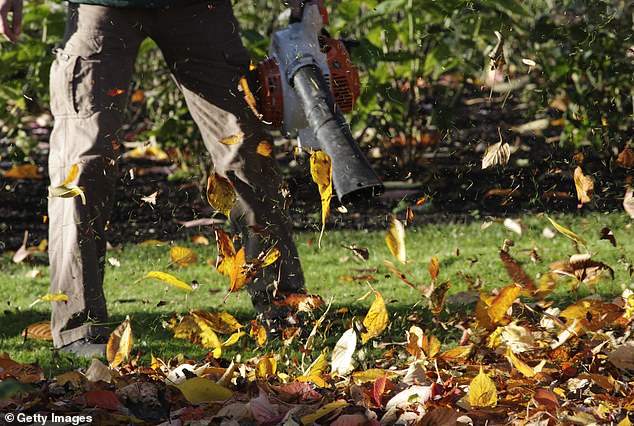We recently had a new family move in next door to us and they seem to be very interested in leaf blowers.
Every other day, the family man puts on his safety glasses and hearing protectors and turns on the leaf blower.
This seems to last for hours and can start before 8am. He even tries it sometimes when it’s dark outside in the late afternoon.
On weekends there is no peace and quiet either.
The family are new neighbors, so we don’t want to cause a big bad smell, but the noise is becoming intolerable and disturbing our daily lives.
Many leaves also end up in our driveway, which is inconvenient and messy.
How can I go about resolving this? Also, can someone tell me what leaf blowers actually do and if they are effective? I can’t see the appeal and use a rake to clean my leaves.
Saga: This is Money reader’s new neighbor has a penchant for noisy leaf blowers
This is Money’s Jane Denton responds: Leaf blowers seem to have become extremely popular in recent years. I’m not sure why.
It’s not uncommon where I live to see people standing astride with their leaf blowers whirring mindlessly without making any progress with the leaves in question. Like you, I’m a fan of raking, shoveling, and trash bags for work.
I can understand why you want to take a cautious approach with your new neighbor. This is a sensible idea and could help prevent problems in the future.
I have asked a lawyer and an acoustics expert for their opinion on the problems you are facing.

Manjinder Kaur Atwal is director of property law at Duncan Lewis Solicitors
Manjinder Kaur Atwal, director of property law at Duncan Lewis Solicitors, says: It’s understandable that you’ll want to approach this situation sensitively, especially with new neighbors, as you don’t want to get off on the wrong foot with them.
However, it is clear that frequent leaf blower use needs to be addressed.
Leaf blowers can be useful tools for clearing debris from driveways and lawns, especially if you have patches of gravel and the like, but they are often criticized for being noisy and disruptive.
Many councils have rules about noise levels and the times when noisy equipment can be used.
In residential areas, noise nuisance laws typically limit such activities between 8:00 a.m. and 6:00 p.m. Monday through Friday and between 9:00 a.m. and 1:00 p.m. on Saturdays. Sunday use is generally discouraged or restricted altogether.
It may simply be that your neighbor is not aware of the nuisance he is causing and starting a friendly conversation may alert him.
Calmly explain how using the leaf blower is affecting your family’s peace and daily routine. Perhaps suggest a compromise, such as agreeing to specific times or days to use the leaf blower.
If this approach does not resolve the issue, you can escalate the issue by contacting your local council.
Your council’s environmental health team can investigate persistent noise complaints to determine whether they breach the Environmental Protection Act 1990 and take appropriate action if necessary. Additionally, many councils provide free or low-cost mediation services to resolve disputes between neighbors, which could be helpful.
As for leaves, politely ask your neighbor to adjust their blower to prevent debris from spreading across your property.
Keep a detailed record of the noise, including dates, times and duration, to support any complaints you make to authorities.
This issue falls under nuisance legislation, which covers interference with the use and enjoyment of land, such as excessive noise. Councils often address these cases as legal nuisances under property and environmental laws.
If the situation worsens or requires legal action, it could also affect neighbor disputes, an area of law that involves resolving disputes between adjacent property owners.
If none of this helps, a solicitor specializing in environmental or property law can advise you on private nuisance claims.
However, I hope that a friendly chat will be enough to resolve the issue amicably. If further action is necessary, do not hesitate to seek help from your local council or obtain legal advice.

Acoustics expert Ed Clarke
Ed Clarke, managing director of Clarke Saunders Acoustics in Winchester, says: It seems like there’s a lot to unpack here, so let’s start with the leaf blower.
There is a wide variety of devices, with different features and noise levels, powered electrically or with gasoline engines. Some blowers can also stink; shred and collect leaves into large bags instead of simply destroying them. They are also known as “garden vacuum cleaners.”
The loudest blowers are the most powerful gasoline models; the larger ones are carried as a backpack, making the operator feel like a ghostbuster. These are the professional ones you’d see municipal contractors use in parks, while the home models look like giant dust destroyers.
Advances in batteries and motors in the garden tool market mean that electric models have virtually the same power as gasoline models and are much quieter. That doesn’t make them completely silent, however, they are still blowing out a lot of air, which can’t be done without making some noise.
Moving on to using your neighbor’s leaf blower. Operating a blower for several hours, several times a week, seems excessive, but maybe you like to keep your lawn spotless and free of leaves at all times. It takes all kinds.
I would think that the size of property that might actually require that level of leaf management would mean that he is some distance from his house at the end of a long drive most of the time. Or maybe your blower actually doesn’t have enough power, which is why it’s taking so long.
As a noise expert, I have spent a lot of time giving expert witness testimony in all types of legal proceedings, and my strong recommendation in neighbor disputes is this: I don’t have them. Disputes, that is. Most of us carry the need to have neighbors.
Your neighbor may not be aware of the intrusion they are causing, or they may not care, but the critical aspect here is how you communicate.
‘Do you even realize how annoying you are?’ and ‘for God’s sake, do you need to do that all the time?’ are good examples of approaches you should not take.
On a Saturday morning, with a rake in hand, I would go and ask if the blower is really more effective; maybe I would even ask to borrow it. Discuss that it is better to remove the blades from both units than to push them back and forth between them.
Then you can see how you notice how much it blows, because it is strong.
If he has an old, noisy gas-powered blower, you could even offer to half-buy a new, quiet, battery-powered one for Christmas.

